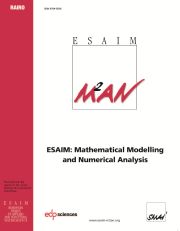Crossref Citations
This article has been cited by the following publications. This list is generated based on data provided by
Crossref.
Karkulik, Michael
Pavlicek, David
and
Praetorius, Dirk
2013.
On 2D Newest Vertex Bisection: Optimality of Mesh-Closure and H 1-Stability of L 2-Projection.
Constructive Approximation,
Vol. 38,
Issue. 2,
p.
213.
Aurada, M.
Feischl, M.
Kemetmüller, J.
Page, M.
and
Praetorius, D.
2013.
EachH1/2–stable projection yields convergence and quasi–optimality of adaptive FEM with inhomogeneous Dirichlet data in Rd.
ESAIM: Mathematical Modelling and Numerical Analysis,
Vol. 47,
Issue. 4,
p.
1207.
Carstensen, C.
Feischl, M.
Page, M.
and
Praetorius, D.
2014.
Axioms of adaptivity.
Computers & Mathematics with Applications,
Vol. 67,
Issue. 6,
p.
1195.
Bruckner, F.
Suess, D.
Feischl, M.
Führer, T.
Goldenits, P.
Page, M.
Praetorius, D.
and
Ruggeri, M.
2014.
Multiscale modeling in micromagnetics: Existence of solutions and numerical integration.
Mathematical Models and Methods in Applied Sciences,
Vol. 24,
Issue. 13,
p.
2627.
Feischl, M.
Führer, T.
and
Praetorius, D.
2014.
Adaptive FEM with Optimal Convergence Rates for a Certain Class of Nonsymmetric and Possibly Nonlinear Problems.
SIAM Journal on Numerical Analysis,
Vol. 52,
Issue. 2,
p.
601.
Feischl, Michael
Führer, Thomas
Heuer, Norbert
Karkulik, Michael
and
Praetorius, Dirk
2015.
Adaptive Boundary Element Methods.
Archives of Computational Methods in Engineering,
Vol. 22,
Issue. 3,
p.
309.
Aurada, Markus
Feischl, Michael
Führer, Thomas
Karkulik, Michael
and
Praetorius, Dirk
2015.
Energy norm based error estimators for adaptive BEM for hypersingular integral equations.
Applied Numerical Mathematics,
Vol. 95,
Issue. ,
p.
15.
Feischl, Michael
Praetorius, Dirk
and
van der Zee, Kristoffer G.
2016.
An Abstract Analysis of Optimal Goal-Oriented Adaptivity.
SIAM Journal on Numerical Analysis,
Vol. 54,
Issue. 3,
p.
1423.
Bringmann, P.
and
Carstensen, C.
2017.
h-adaptive least-squares finite element methods for the 2D Stokes equations of any order with optimal convergence rates.
Computers & Mathematics with Applications,
Vol. 74,
Issue. 8,
p.
1923.
Bringmann, P.
and
Carstensen, C.
2017.
An adaptive least-squares FEM for the Stokes equations with optimal convergence rates.
Numerische Mathematik,
Vol. 135,
Issue. 2,
p.
459.
Bespalov, Alex
Haberl, Alexander
and
Praetorius, Dirk
2017.
Adaptive FEM with coarse initial mesh guarantees optimal convergence rates for compactly perturbed elliptic problems.
Computer Methods in Applied Mechanics and Engineering,
Vol. 317,
Issue. ,
p.
318.
Blechta, Jan
Málek, Josef
and
Vohralík, Martin
2020.
Localization of the W-1,q norm for local a posteriori efficiency.
IMA Journal of Numerical Analysis,
Vol. 40,
Issue. 2,
p.
914.
Kurz, Stefan
Pauly, Dirk
Praetorius, Dirk
Repin, Sergey
and
Sebastian, Daniel
2021.
Functional a posteriori error estimates for boundary element methods.
Numerische Mathematik,
Vol. 147,
Issue. 4,
p.
937.
Chaumont-Frelet, Théophile
and
Vohralík, Martin
2021.
Equivalence of local-best and global-best approximations in H(curl).
Calcolo,
Vol. 58,
Issue. 4,
Faustmann, Markus
Melenk, Jens Markus
and
Parvizi, Maryam
2021.
On the stability of Scott-Zhang type operators and application to multilevel preconditioning in fractional diffusion.
ESAIM: Mathematical Modelling and Numerical Analysis,
Vol. 55,
Issue. 2,
p.
595.
Bringmann, Philipp
2022.
How to prove optimal convergence rates for adaptive least-squares finite element methods∗.
Journal of Numerical Mathematics,
Vol. 0,
Issue. 0,
Ern, Alexandre
Gudi, Thirupathi
Smears, Iain
and
Vohralík, Martin
2022.
Equivalence of local- and global-best approximations, a simple stable local commuting projector, and optimal hp approximation estimates in
H
(div).
IMA Journal of Numerical Analysis,
Vol. 42,
Issue. 2,
p.
1023.
Ali, Mazen
Funken, Stefan A
and
Schmidt, Anja
2022.
H
1-stability of the L2-projection onto finite element spaces on adaptively refined quadrilateral meshes.
IMA Journal of Numerical Analysis,
Vol. 42,
Issue. 3,
p.
2684.
Stevenson, Rob
2023.
A Convenient Inclusion of Inhomogeneous Boundary Conditions in Minimal Residual Methods.
Computational Methods in Applied Mathematics,
Bulle, Raphaël
Hale, Jack S.
Lozinski, Alexei
Bordas, Stéphane P.A.
and
Chouly, Franz
2023.
Hierarchical a posteriori error estimation of Bank–Weiser type in the FEniCS Project.
Computers & Mathematics with Applications,
Vol. 131,
Issue. ,
p.
103.




